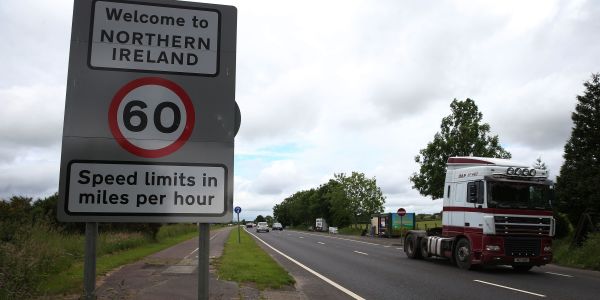Northern Ireland would be the worst hit of all economies by a Brexit, the Irish Republic’s leading think-tank has warned.
The Economic and Social Research Institute (Esri), set up to help advise the Dublin government, has predicted farming and food producers would be among those paying the biggest price in the event of the UK leaving the EU.
The industries are key to Northern Ireland’s economy.
In its latest quarterly economic report, the State-funded think-tank also suggests any barriers to cross-border trade could “heavily” impact prosperity in the region.
Kieran McQuinn, research professor at the Esri and report author, said the Irish Republic will also be impacted – though less so – by a knock-on effect.
“Of all the economies in this part of the world we think the Northern Ireland economy will be the worst hit by Brexit, because of it is very heavily reliant on agriculture and food processing generally,” he said.
“It is also very integrated with the Republic’s overall economy.
“Therefore any types of barriers or impediments to trade between it and the Republic, I think will hit it quite heavily.”
Mr McQuinn said the ability of Northern Ireland to withstand a fall-out from a Brexit would come down to subsequent trade negotiations, which could see traders and businesses being shouldered with new costs.
“Northern Ireland agricultural producers could find themselves facing a significant tariff for example,” he said.
“Another possibility is that they could lose direct aid payments they get as part of the Common Agricultural Policy – so I think the Northern Ireland economy could be hit quite adversely by Brexit.
“That would also have negative implications for us in the Republic.”
The Esri has predicted the Republic’s economy – based on the value of all goods and services in the country known as gross domestic product (GDP) – will grow by 4.6% this year and 4.2% next year.
That is more than twice the growth rate of most European economies.
However, the forecast growth is slightly less than previously expected because of a downturn in global trade and the uncertainty caused by the imminent EU referendum.
Mr McQuinn said the short-term impact of Brexit uncertainty may have been played out already in the Irish economy.
However, if the UK votes to leave the EU on Thursday there could be further issues ahead.
“Markets tend to figure into their expectations all the adverse outcomes,” he said.
“So Thursday could come along with the Brexit result and there could possibly be no further escalation or deterioration of exchange rate and the like.
“But on the medium term it could affect Ireland on the trade side. What exactly will be the trade situation, what kind of border will we have?”
The remarkable bounce-back of the Irish economy is being driven mostly by wage increases, more jobs and more spending, the Esri says.
Heading back to boom-time levels, the unemployment rate is expected to drop to 7.6% by end of this year and down to 6.5% the following year.
Joblessness had surged to more than 15% just four years ago.
“People are beginning to feel the recovery a little bit,” said Mr McQuinn.
“They are beginning to see it in their wages and greater numbers of people at work. Put it all together, and people are spending more.
“Then on the investment side, people put off a lot of decisions to invest during the downturn and now they are beginning to invest again in the economy.”
However, the housing shortage is predicted to continue for at least another two years.
“We feel it will be 2018 at the earliest and probably more like 2019 before we see the housing supply up to the level required,” he added.
“There is a variety of problems there at the moment and there is no real silver bullet.
“Given we are going to have a shortage of supply over the coming years unfortunately house prices and particularly rents are only going to go in one direction – and that is up.”
